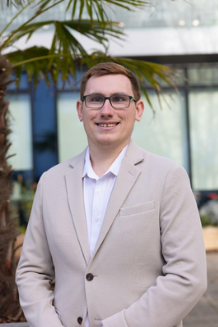
The negotiations were dogged by frequent, sometimes inexplicable, procedural and organisational mis-steps, but could even a perfectly executed week of talks have bridged the chasm between those who wanted a strong, ambitious treaty and those who wanted to continue to use, dispose of and profit from plastics with only a superficial nod towards sustainability? Sam Winton sums up where INC 5.2 leaves hopes for a global plastics treaty or finding another way forward.
This did not need to be inevitable but I believe choices made at the highest levels in this process, both among members and the leadership, have made it so. Inefficient working methods, obstruction from unambitious members, and a religious commitment to consensus in the face of reality gave this session little hope of success and it was therefore no surprise to me when Ambassador Vayas confirmed that no agreement had been reached on Friday morning. Indeed I predicted this outcome as long ago as INC4 in Ottawa, 16 months ago.
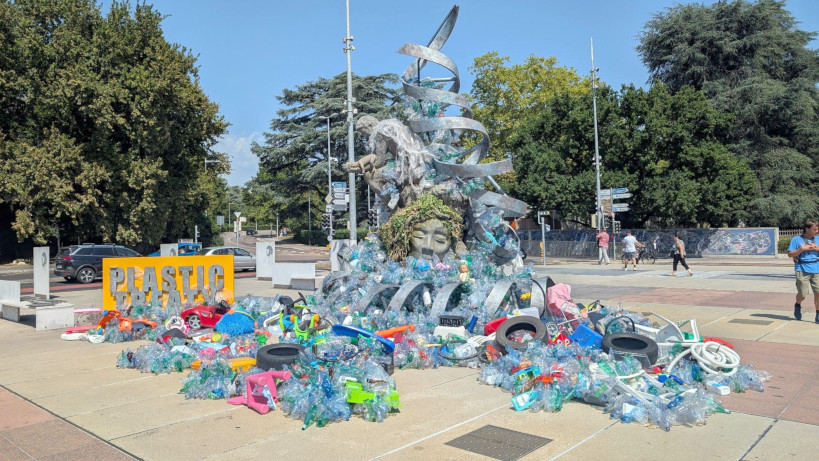
The Thinker’s Burden, a sculpture by Benjamin Von Wong which highlights the growing health and environmental impacts of an unregulated plastic industry on both people and planet Photo: Sam Winton
Fortunately for readers, my account of the events of the closing days in Geneva need not be as exhausting to recount as they were to experience. With a plenary session scheduled for 3pm on Thursday, I arrived shortly after midday to secure a seat in the Assembly Hall, anticipating a lively final day of negotiations. We expected a revised draft text to be presented, and to hear members’ reflections on that text, with the hope that it, or another minor revision could be forwarded for legal review. While the INC was scheduled to conclude on Thursday, I had heard that the venue and translators were booked until 6pm on Friday. I therefore arrived prepared, both mentally, and with copious snacks for the long haul.
Time can be a vague concept at UN negotiations
This preparation proved invaluable. The plenary was first postponed until 6pm, then 7, 8 and then indefinitely. At 8.30pm the app updated to show a 9pm plenary, then 9.30, 10.30 before finally settling on 11.30pm. Patience, in UN circles, is an essential virtue. Throughout the day, delegates had been meeting in Heads of Delegations meetings, bilaterals, regional and other group consultations, all behind closed doors and in an attempt to inform an acceptable amendment to the Chairs draft text. However, among the people both on, and connected to, national delegations I spoke to, the message was clear. There was very little progress to share, very little movement, particularly from the Like-Minded group, and no clear path forward. By the evening, observers were mostly gathered on the lawns outside the UN buildings, asking each familiar face who walked by if they had any exciting news and surrounded by boxes of pizza and other takeaway food ordered to the gates of the Palais de Nations. With rumblings of thunder and flashes of lightning from a distant thunderstorm over the Alps, it was a surreal but oddly enjoyable evening, connecting with old friends and new contacts from around the world with a shared sense of anticipation. Even so, when 11.30 came around and delegates gathered in the Assembly Hall, we were all relieved to be finally getting down to business.
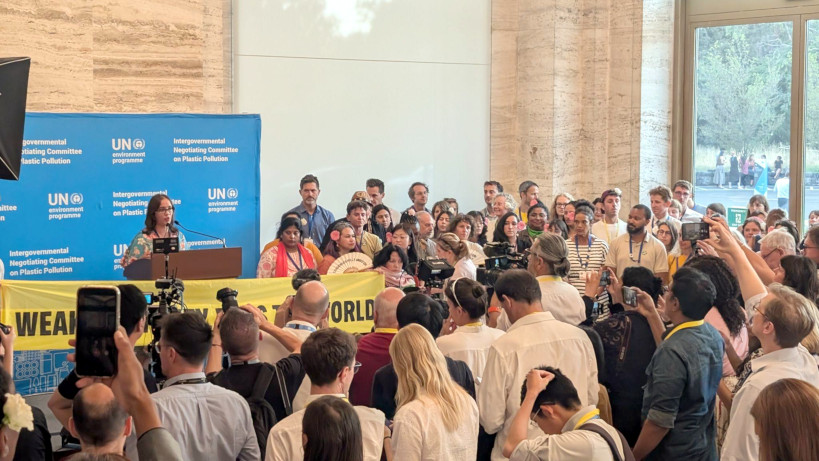
On Thursday afternoon, the Women’s Major Group and Indigenous Peoples Caucus addressed delegates and media with an overarching message ‘A weak treaty will fail the world’ Photo: Sam Winton
The shortest plenary in UN history
‘I have convened this plenary to update you on the status of my work. As consultations on my revised draft text are still ongoing, this plenary is therefore adjourned to be convened on the 15th of August 2025, in the morning, at a time to be announced. This meeting is adjourned.’
The above remarks by Ambassador Vayas took just 31 seconds to deliver, gavel to gavel, and marked the extent of Thursday’s evening plenary session. After a brief hush, to process what had been said, many of the observers and some national delegates in the hall burst into a shocked, tired and slightly delirious laughter. Of the many outcomes we had considered from this plenary that I had spent 11.5 hours waiting for, the shortest Plenary in UN history had not been on any of our bingo cards. Believing that our work for the evening was done, and that we would be returning in the morning, delegates left the Assembly Hall, looking forward to a night of rest ahead of an extra day of negotiations. However, as we approached the gates to the UN compound, whatsapp groups burst into life with messages from regional coordinators. A time had not been confirmed for resumed work and now, at 11.50pm, the morning of the 15th was technically just 10 minutes away. We may not be getting our rest after all. Shortly after midnight the schedule did indeed update and another Heads of Delegations meeting had been set for 2-4am. With it clear that the earliest a resumed plenary could occur would be 5am myself and colleagues from the University of Portsmouth headed back to the city centre for refreshment and rest in preparation for Friday’s work.
By 1am a revised draft text had been released, a fairly minor iteration, moving in the right direction for ambition but still falling far short of the red lines of ambitious members and re-crossing red lines of the Like-Minded group. It was immediately clear that this was not a text which could achieve consensus and chance encounters with government representatives and other delegates in the city centre gave me my most concrete insights of the day. There was a sense that the day had been a waste of time, very little progress had been made and that failing to deliver a text to the plenary on Thursday had been a missed opportunity to review progress. Other discussions, since echoed by multiple sources, suggested that the leadership of the process, out of options, seeing no clear way forward, and succumbing to internal disagreements, may be beginning to fracture.
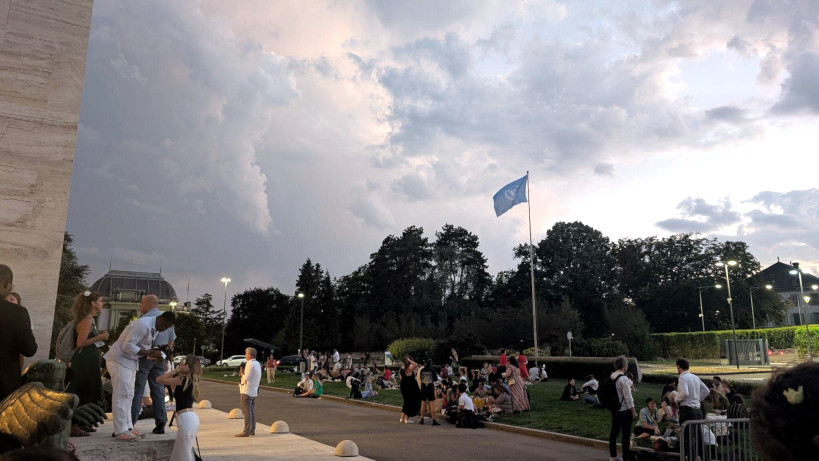
Storm clouds gather over the Palais des Nations as news filters through to observers gathered on the lawns that progress is not being made Photo: Sam Winton
Deep into the night, a white flag is raised for this session
When my 5am alarm went off after a brief, hour-long nap, there was a notification of a 5.30am plenary on the schedule. Myself and other delegates rushed back to the Palais des Nations to see if a hail mary solution had been found or if, once again, the committee had failed to deliver a treaty:
‘Distinguished colleagues and friends. Thank you from the bottom of my heart for being here at this closure session of INC 5.2’
With these opening words as the plenary commenced at 6.12am, it was instantly clear to me that no agreement had been reached, both from Ambassador Vayas’ tone, and the fact that if there was a way forward, further sessions would be needed throughout the day to prepare the agreed text and this would not be a ‘closure session’. Members shared national statements reflecting disappointment in a ‘historic missed opportunity’, restating many national positions, and opining divergent views on the way forward. I have rarely been in a room which felt so deflated and with so little energy, a symptom both of extreme sleep deprivation and frustration. While the closing plenary in Busan contained many impassioned statements, most delegates would probably have preferred to be going to bed, rather than hearing nearly 3 hours of national views. Even the usually highly anticipated statement from Panama was uncharacteristically subdued. However, there was no sense that countries are walking away from ambition. Indeed, Tuvalu on behalf of PSIDS, a keystone for ambition in this process remarked ‘What is the point of a global agreement if global cooperation is abandoned in favour of national measures’ and many ambitious members reiterated their commitment to ending plastic pollution. Most interestingly, Türkiye stated that ‘a legally binding instrument is not a luxury. It is a necessity’ and China referenced the triple planetary crisis of climate change, biodiversity loss, and pollution. These are two countries who have not been at the forefront of ambition in this process but whom geopolitical events could push closer to alignment with ambitious members, creating promising opportunities for ambition.
In an INC beset with confused processes and procedural irregularities, the acrimonious end to proceedings in Geneva was fitting. As the Chair opened the floor for closing statements from observers, the US objected, preferring to immediately close the session and this was backed up by Kuwait stating that delegates’ need for sleep was a ‘health issue’. Even if true, the irony of this statement from a delegation who have spent the week trying desperately to avoid consideration of health in the treaty cannot be ignored. In what, I suspect, was a desperate attempt to get out of the room as soon as possible, Ambassador Vayas swiftly gaveled the session closed, despite several outstanding requests to make points of order from the floor. This is in clear contradiction of the rules of procedure and members of delegations including Brazil and Mexico were left exasperated, with members of the secretariat and bureau stepping in to diffuse tensions as the stage was vacated.
A stalling process, frustrated by an unwillingness to compromise
I believe my updates this week have made clear that I have been frustrated with the process and I have often criticised decisions taken by the leadership. However, I respect the hard work of the Chair, his team, and the secretariat and do not believe any chair or work plan could have delivered an agreement this week. Senegal remarked that they can now recite off by heart, the positions of member states, and it was noted by Australia that the red lines expressed by members are incompatible with each other. Where then, does the process go from here? I agree with Columbia’s assessment that despite a majority of countries having constructive attitudes, negotiations have been consistently blocked by a small number of countries. There is no clear path forward.
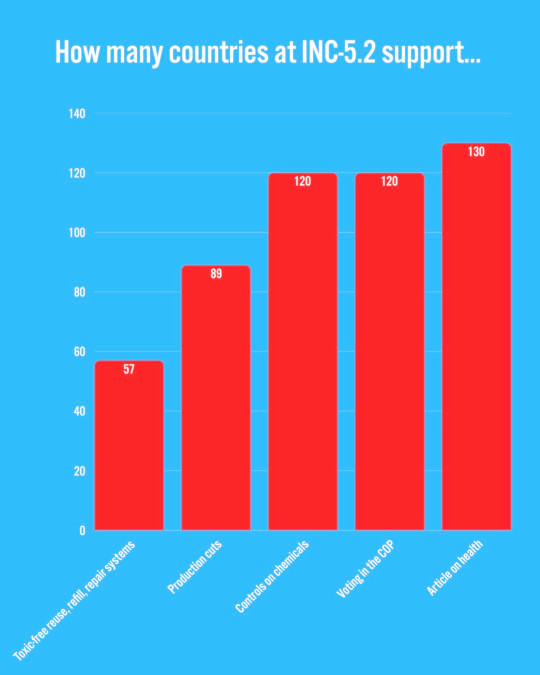
Analysis by the Environmental Justice Foundation highlights that support for critical elements of the treaty far outweighs the hardline opposition. Credit: Environmental Justice Foundation
To resume or not to resume. The choice remains unclear
In the words of Mexico, ‘What comes next? What will the room do? What decisions will the committee make?’. The session has been adjourned, leaving the default position being an INC 5.3 at some point in the future. However I do not believe that this is a foregone conclusion. The process is hopelessly deadlocked and countries including South Africa and Switzerland have reflected that, without a mechanism to break the deadlock, another similar meeting may not make progress. Will donor countries put forward the funds for another INC if a path to progress is not clear. On the topic of progress, the Chair’s 2 latest text iterations will not be forwarded and the assembled text from Saturday was never proposed to the plenary as a basis for further discussion. This means that, in terms of text edits, no progress made in Geneva is expected to be forwarded and we are likely to revert to the previous Chairs text from last December. We will therefore need to start any resumed session with the same text edits which have already been made across 3 sessions since Ottawa, wasting further time.
This negotiation is on life support and the course of treatment and prognosis are yet to be determined. Peru believes that a package of measures with majority support is possible. I wholeheartedly agree. However, in a consensus driven process it simply cannot be delivered. I see little benefit from an INC 5.3 unless UNEP and members wake up to the reality that, for a minority of countries, the only goal is frustration and delay. When faced with bad faith, there is no path to compromise.
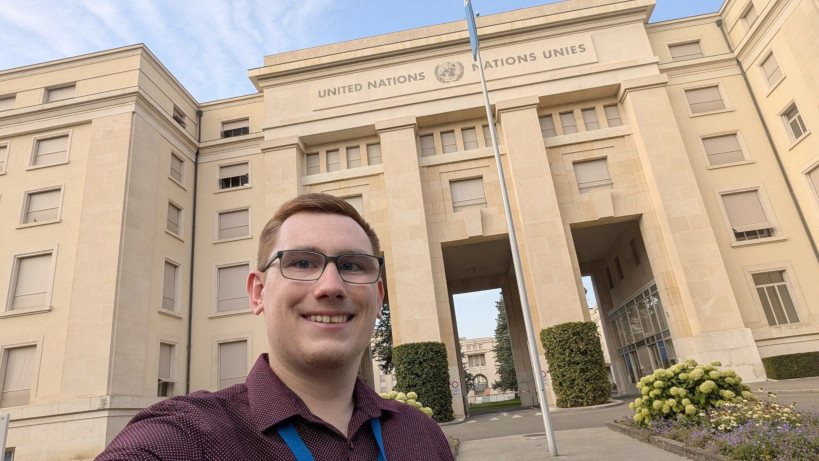
Despite frustrations, it has been a pleasure to report on progress at INC 5.2 in Geneva. I will be continuing my research following the treaty process and look forward to resuming this blog series at a date and location to be determined Photo: Sam Winton
If we can find a more structured working methodology, if we can break free from a recurring cycle of inserting, cleaning and reinserting brackets, if we can break through UNEPs bizarre aversion to voting, I will look forward to a resumed session where members can finally emerge from a procedural quagmire and work in the spirit of compromise and good faith. If this cannot be achieved, I would encourage ambitious members to lay this process to rest, and to take the hard work and progress made in Geneva forward into a new process, free from the shackles of the past 3 years and create a treaty that will save succeeding generations from the scourge of plastic pollution.
BIO
I am a postgraduate researcher working for the Revolution Plastics Institute at the University of Portsmouth since its creation in 2020. In 2023 I commenced my PhD studies titled ‘To what extent has the structure and implementation of the INC process facilitated the development of an effective Global Plastics Treaty?’ at the University of Portsmouth and the University of Surrey. This research will focus on how the structure and implementation of the INC process impact the treaty’s outcome, consider how the inclusion of stakeholders in the process influences a fair and just treaty, and investigate the implications of the final text for members. With a background in environmental hazards and community preparedness, my main research focus is working with communities and a broad range of stakeholders to tackle environmental challenges. I have also worked with international organisations to create policies to tackle the global plastics problem and facilitate sustainable development.

I found this article extremely useful and well-written. The information provided is clear and relevant.
Very interesting perspective shared here. I recently read about Agentic AI training programs and they seem quite promising.
This is a powerful and sobering summary of INC-3 — the latest round of negotiations toward a Global Plastic Pollution Treaty. The article does an excellent job of showing both the promise and the perils: on one hand, delegates managed a first reading of the Zero Draft, opened substantive discussions on reuse models, workers’ rights, and even broader systemic thinking about plastic lifecycle.
Well written! My site Solveredu
This article is a powerful reminder that real progress often requires confronting difficult truths. The incomplete outcomes at INC 5.2 underscore the challenges of international negotiations — but also highlight the urgency of bold, collaborative action to address plastic pollution. Let’s hope this marks the beginning of a stronger, more effective path forward.